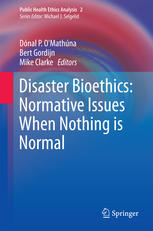

Most ebook files are in PDF format, so you can easily read them using various software such as Foxit Reader or directly on the Google Chrome browser.
Some ebook files are released by publishers in other formats such as .awz, .mobi, .epub, .fb2, etc. You may need to install specific software to read these formats on mobile/PC, such as Calibre.
Please read the tutorial at this link: https://ebookbell.com/faq
We offer FREE conversion to the popular formats you request; however, this may take some time. Therefore, right after payment, please email us, and we will try to provide the service as quickly as possible.
For some exceptional file formats or broken links (if any), please refrain from opening any disputes. Instead, email us first, and we will try to assist within a maximum of 6 hours.
EbookBell Team

4.7
56 reviewsThis book provides an early exploration of the new field of disaster bioethics:
examining the ethical issues raised by disasters. Healthcare ethics issues are addressed in the first part of this book. Large-scale casualties lead to decisions about who to treat and who to leave behind, cultural challenges, and communication ethics. The second part focuses on disaster research ethics.
With the growing awareness of the need for evidence to guide disaster preparedness and response, more research is being conducted in disasters. Any research involving humans raises ethical questions and requires appropriate regulation and oversight. The authors explore how disaster research can take account of survivors? vulnerability, informed consent, the sudden onset of disasters, and other ethical issues. Both parts examine ethical challenges where seeking to do good, harm can be done. Faced with overwhelming needs and scarce resources, no good solution may be apparent. But choosing the less wrong option can have a high price. In addition, what might seem right at home may not be seen to be right elsewhere. This book provides in-depth and practical reflection on these and other challenging ethical questions arising during disasters.
Scholars and practitioners who gathered at the Brocher Foundation in Geneva, Switzerland in 2011 offer their reflections to promote further dialogue so that those devastated by disasters are respected by being treated in the most ethically sound ways possible.